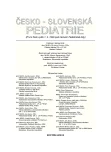-
Medical journals
- Career
Treatament of Tobacco Dependence – New, Important and Difficult Medical Topic
Authors: E. Králíková 1,2; A. Kmeťová 1,2; M. Šípková 3
Authors‘ workplace: Ústav hygieny a epidemiologie 1. LF UK a VFN, Praha přednosta doc. MUDr. M. Tuček, CSc. 1; Centrum pro závislé na tabáku III. interní kliniky – kliniky endokrinologie a metabolismu 1. LF UK a VFN, Praha přednosta prof. MUDr. Š. Svačina, DrSc., MBA 2; Plicní oddělení – Centrum pro závislé na tabáku, Krajská nemocnice Liberec primář MUDr. J. Vytiska 3
Published in: Čes-slov Pediat 2010; 65 (10): 613-615.
Category: Actual Topic
Overview
Tobacco dependence mostly arises in adolescent age. Unfortunately in the Czech Republic each ninth smoker is in the age under 18. Although the prevention cannot be overlooked we have to understand that also treatment is needed in this age group. This is a new and apparently important topic in the medicine adolescent smokers become adult smokers. So far experience or evidence based publications are not available because those smokers are not motivated to quit and have no adherence to the treatment. The interest in treatment is substantial there. This was a topic of the EU project ACCESS described in this paper.
Key words:
tobacco dependence, smoking cessation, adolescents, motivation
Sources
1. Fiore MC, Bailey WC, Cohen SJ, et al. Treating Tobacco Use and Dependence: Clinical Practice Guideline. Rockville, MD, US Department of Health and Human Services, 2008.
2. Sovinová H, Sadílek P, Csémy L. Vývoj prevalence kuřáctví v dospělé populaci ČR, názory a postoje občanů ČR k problematice kouření (období 1997–2009). Praha: SZU, 2010, http://www. szu.cz/uploads/documents/czzp/zavislosti/koureni/Zprava2009DEF.pdf.
3. Mezinárodní klasifikace nemoci, 10. verze. Praha: WHO, 1992 : 1–646.
Labels
Neonatology Paediatrics General practitioner for children and adolescents
Article was published inCzech-Slovak Pediatrics

2010 Issue 10-
All articles in this issue
- Specific Aspects of Selected Sleep Disorders in Childhood
- Prenatal Effects of Alcohol
- Treatament of Tobacco Dependence – New, Important and Difficult Medical Topic
- Some Controversies in Gynecology and Obstetrics
- Prophylaxis of Early-onset Streptococcal Sepsis in Newborn Infants
- Hospitalization of Children for Bronchiolitis in Slovakia in 1996–2006
- Importance of Molecular Genetic Analysis for Diagnosis and Genetic Counseling in Families with Hyperammonemia and Ornithine carbamoyltransferase Deficiency
- Fetomaternal Haemorrhage as a Cause of Severe Neonatal Anaemia
- Procedural Pain in the Newborn: Possible Prevention and Mitigation
- The Problems of Short Frenulum
- Czech-Slovak Pediatrics
- Journal archive
- Current issue
- Online only
- About the journal
Most read in this issue- The Problems of Short Frenulum
- Prenatal Effects of Alcohol
- Prophylaxis of Early-onset Streptococcal Sepsis in Newborn Infants
- Fetomaternal Haemorrhage as a Cause of Severe Neonatal Anaemia
Login#ADS_BOTTOM_SCRIPTS#Forgotten passwordEnter the email address that you registered with. We will send you instructions on how to set a new password.
- Career

